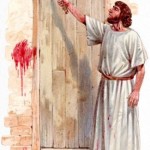 And they said to one another, “Did not our heart burn within us while He talked with us on the road, and while He opened the Scriptures to us?” (Luke 24:32)
And they said to one another, “Did not our heart burn within us while He talked with us on the road, and while He opened the Scriptures to us?” (Luke 24:32)
Cleopas and his friend are on the road to Emmaus, when they are joined by a mysterious stranger who wants to know why they are so sad.
They give a Reader’s Digest version of Jesus’ earthly life. He was “a prophet mighty in deed and word before God and all the people” who was crucified by the powers that be.
Listen to the pathos in these poignant words: “We were hoping that it was He who was going to redeem Israel.”
Yes, they had heard the reports of the women who had seen the empty tomb. But they had not seen him personally. Neither had their buddies. So they were not sure what had actually happened.
After Jesus explains to them how everything that happened was a fulfilment of prophecy, he keeps on going. They invite him to “abide with us.” He does.
When he breaks the bread, their eyes are opened and they recognize him as Jesus.
That’s when they utter these immortal words. “Did not our heart burn within us while He talked with us on the road, and while He opened the Scriptures to us?”
You can almost hear them say: “How could we have been so dense that we could not recognize him earlier on in the journey?”
It is reminiscent of Jacob waking up after he has just seen the amazing dream that we have come to know as “Jacob’s ladder.”
Here is what he says: “Surely the Lord is in this place, and I did not know it.” And he was afraid and said, “How awesome is this place! This is none other than the house of God, and this is the gate of heaven!” (Genesis 28:16-17)
Jacob and the disciples on the road to Emmaus receive revelation…but only in retrospect.
Is it fair to say that most of us can relate to the aforementioned characters?
Have we not also had those moments when we perhaps slapped ourselves on the forehead and said words like: “I should’ve known all along…why didn’t I…how (you fill in the blanks) could I have been not to…?”
Of course, it would be preferable to receive revelation at the very outset, but, frankly, there is nothing to be ashamed of in receiving it in retrospect.
Someone once said: “Life must be lived forward, but it can only be understood backward.”
There is a lot of truth to that statement, isn’t there?
Often, it is only as we look back on what happened that we recognize where God was in that moment.
When we are in the moment, we can be blinded by what we see that we fail to see what we ought to see.
The guilt of cheating his brother, the fear of running for his life and the anxiety of what lay ahead in Haran prevented Jacob from seeing that surely God was in that seemingly God-forsaken place.
The grief of losing their Lord, the lack of confirmation of the women’s accounts and the disappointment of seeing their hopes dashed stood in the way of the disciples recognizing the stranger as the one who no longer called them servants but friends.
Once the revelation finally hit them, watch what they did.
Jacob turned his rock-hard pillow into an altar.
Cleopas and his companion turned back toward Jerusalem to tell the rest of the disciples: “We have seen the Lord!”
So, if you’ve had revelation, but only in retrospect, don’t feel bad. It happened to Jacob. It happened to disciples who had spent three plus years in close proximity to Jesus.
What can I say…it happens to the best of us…as well as the rest of us 🙂
Perhaps what we need to do is exactly what they did…offer sacrifices of praise on the altar of worship and share our revelation with those who are eager to receive it. Amen?









Follow Us